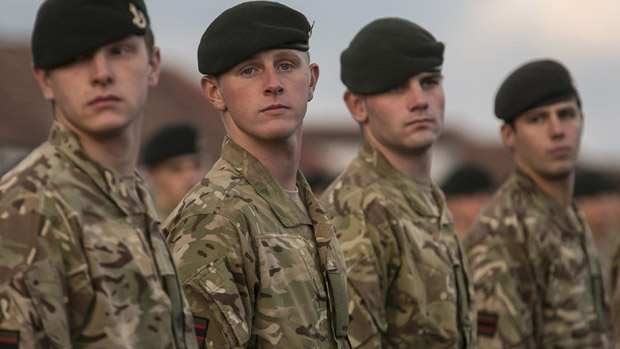Britain's child soldiers: should the enlistment age be raised?
Veterans argue signing up offers young people a better life, but campaigners say it's unethical and exploitative

A free daily email with the biggest news stories of the day – and the best features from TheWeek.com
You are now subscribed
Your newsletter sign-up was successful
Campaigners are taking legal action over the terms of enlistment for minors in the British army, accusing the Ministry of Defence of "exploiting" young recruits.
Child Soldiers International (CSI) is calling for a judicial review over what it calls "unethical and unlawful age discrimination". Their lawyers argue that soldiers who enlist at 16 are forced to serve for longer under army rules.
Teenagers cannot see active service until they are 18, but all soldiers must be available for deployment for four years. So a 16-year-old who joins the army cannot leave until that are 22.
The Week
Escape your echo chamber. Get the facts behind the news, plus analysis from multiple perspectives.

Sign up for The Week's Free Newsletters
From our morning news briefing to a weekly Good News Newsletter, get the best of The Week delivered directly to your inbox.
From our morning news briefing to a weekly Good News Newsletter, get the best of The Week delivered directly to your inbox.
"These young soldiers will be forced to put their lives on the line against their will during those two extra years, all because of a decision they made at 16 and later regretted," said CSI director Richard Clarke.
The latest move by the campaign group has reignited the debate about the enlistment age in the UK and comes as an independent survey found that 78 per cent of people believe it should be raised. "There is overwhelming public support in this country for a minimum enlistment age of 18," said Clarke.
The UK is the only country in Europe and the only country among the permanent members of the UN Security Council to recruit 16-year-olds into its armed forces. It is also just one of 17 countries in the world to do so, alongside North Korea, Pakistan and Iran.
Early enlistment has been associated with greater risk on the front line. According to research by the charity Forces Watch, the risk of fatality in Afghanistan for recruits who enlisted aged 16 is twice as high as for those who enlisted at 18 or older.
A free daily email with the biggest news stories of the day – and the best features from TheWeek.com
Veteran David Buck, who joined the army aged 17 and was deployed to Kosovo aged 19 told Sky News he was ill-prepared for war and now suffers from severe post-traumatic stress disorder. "I didn't expect to see what I saw. Being such a young age it is hard to make an informed decision," he said.
"If you join or deploy when you're a bit older then you've got a bit more life experience under your belt."
The MoD points out minors make up a small minority of all soldiers - just 1.3 per cent of all military personnel. And while they can join the army at 16, they need full parental consent and will not be deployed until they reach 18.
It says its enlistment policies are fully compliant with United Nations guidelines and there are no plans to change the minimum enlistment age.
Another former serviceman who joined the army when he was 16 told the BBC "it gives you self-confidence, self-discipline and certain self-determination".
"A career in the Armed Forces provides young people with a wealth of benefits and opportunities, equipping them with valuable and transferable skills for life," the MoD said in a statement to Channel 4 News. It says it is "encouraging" that recruits continue to recognise this "and are coming forward to serve their country."